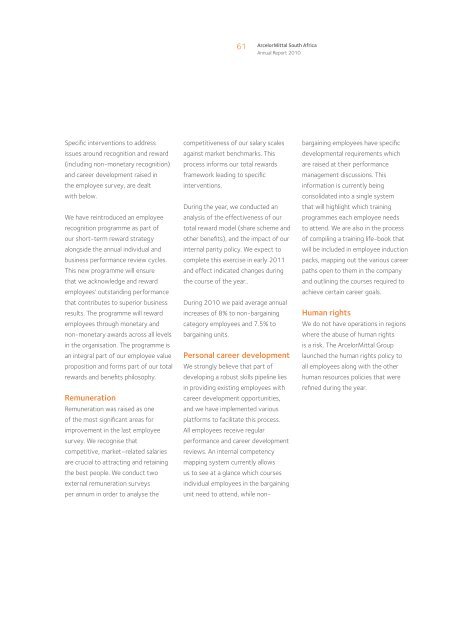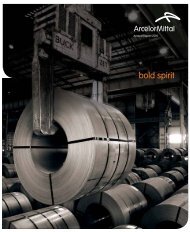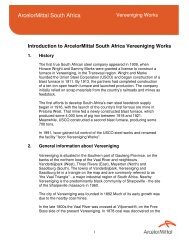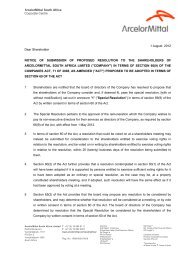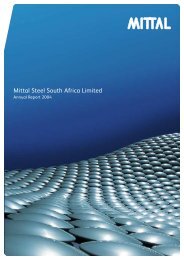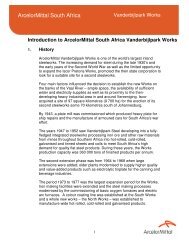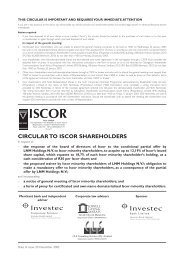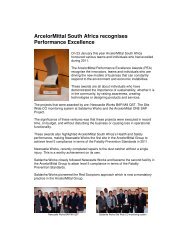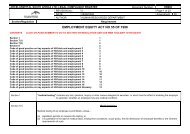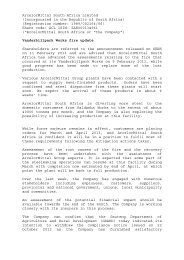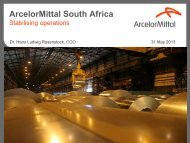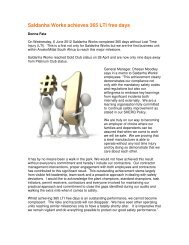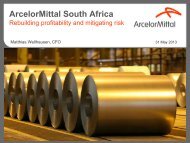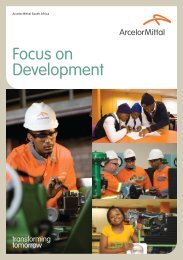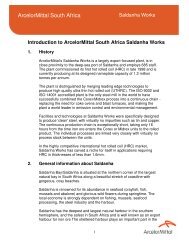bold spirit - ArcelorMittal South Africa
bold spirit - ArcelorMittal South Africa
bold spirit - ArcelorMittal South Africa
Create successful ePaper yourself
Turn your PDF publications into a flip-book with our unique Google optimized e-Paper software.
61<br />
<strong>ArcelorMittal</strong> <strong>South</strong> <strong>Africa</strong><br />
Annual Report 2010<br />
Specific interventions to address<br />
issues around recognition and reward<br />
(including non-monetary recognition)<br />
and career development raised in<br />
the employee survey, are dealt<br />
with below.<br />
We have reintroduced an employee<br />
recognition programme as part of<br />
our short-term reward strategy<br />
alongside the annual individual and<br />
business performance review cycles.<br />
This new programme will ensure<br />
that we acknowledge and reward<br />
employees’ outstanding performance<br />
that contributes to superior business<br />
results. The programme will reward<br />
employees through monetary and<br />
non-monetary awards across all levels<br />
in the organisation. The programme is<br />
an integral part of our employee value<br />
proposition and forms part of our total<br />
rewards and benefits philosophy.<br />
Remuneration<br />
Remuneration was raised as one<br />
of the most significant areas for<br />
improvement in the last employee<br />
survey. We recognise that<br />
competitive, market−related salaries<br />
are crucial to attracting and retaining<br />
the best people. We conduct two<br />
external remuneration surveys<br />
per annum in order to analyse the<br />
competitiveness of our salary scales<br />
against market benchmarks. This<br />
process informs our total rewards<br />
framework leading to specific<br />
interventions.<br />
During the year, we conducted an<br />
analysis of the effectiveness of our<br />
total reward model (share scheme and<br />
other benefits), and the impact of our<br />
internal parity policy. We expect to<br />
complete this exercise in early 2011<br />
and effect indicated changes during<br />
the course of the year..<br />
During 2010 we paid average annual<br />
increases of 8% to non-bargaining<br />
category employees and 7.5% to<br />
bargaining units.<br />
Personal career development<br />
We strongly believe that part of<br />
developing a robust skills pipeline lies<br />
in providing existing employees with<br />
career development opportunities,<br />
and we have implemented various<br />
platforms to facilitate this process.<br />
All employees receive regular<br />
performance and career development<br />
reviews. An internal competency<br />
mapping system currently allows<br />
us to see at a glance which courses<br />
individual employees in the bargaining<br />
unit need to attend, while nonbargaining<br />
employees have specific<br />
developmental requirements which<br />
are raised at their performance<br />
management discussions. This<br />
information is currently being<br />
consolidated into a single system<br />
that will highlight which training<br />
programmes each employee needs<br />
to attend. We are also in the process<br />
of compiling a training life-book that<br />
will be included in employee induction<br />
packs, mapping out the various career<br />
paths open to them in the company<br />
and outlining the courses required to<br />
achieve certain career goals.<br />
Human rights<br />
We do not have operations in regions<br />
where the abuse of human rights<br />
is a risk. The <strong>ArcelorMittal</strong> Group<br />
launched the human rights policy to<br />
all employees along with the other<br />
human resources policies that were<br />
refined during the year.


